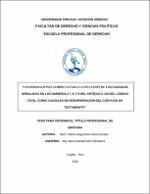Consideraciones jurídicas para la inclusión de las causales señaladas en los numerales 7,8 y 9 artículo. 333 del código civil, como causales de desheredación del cónyuge en testamento

Ver/
Descargar
(application/pdf: 131.9Kb)
(application/pdf: 131.9Kb)
Fecha
2021Autor(es)
Antón Estrada, Fátima Alejandrina
Metadatos
Mostrar el registro completo del ítemResumen
La presente tesis tiene por finalidad exponer cuales son las consideraciones jurídicas para inclusión
de las causales señaladas en los numerales 7, 8 y 9 del Artículo. 333, del Código Civil, como
causales de desheredación del cónyuge en testamento.
Se aplicaron métodos jurídicos, así como el deductivo e inductivo, concluyendo que los numerales
referidos al “uso habitual e injustificado de drogas alucinógenas o de sustancias que puedan
generar toxicomanía, salvo lo dispuesto en el artículo 347; la enfermedad grave de transmisión
sexual contraída después de la celebración del matrimonio y la homosexualidad sobreviniente al
matrimonio”, son causales de separación de cuerpos reguladas en nuestro ordenamiento jurídico
para proteger los derechos sucesorios del testador , por lo que las causales no deben limitarse a
solo 6, sino más bien deben extenderse e incluirse las causales 7, 8 y 9 antes referidas siendo
necesario que el legislador establezca de manera detallada y taxativa estos supuestos y de esta
manera proteger los derechos patrimoniales y sucesorios del testador. The purpose of this thesis is to explain what are the legal considerations for the inclusion of the
causes indicated in subsections 7, 8 and 9 of article. 333, of the Civil Code, as grounds for
disinheritance of the spouse in will.
Legal methods were applied, as well as the deductive and inductive, concluding that the
subparagraphs referred to the “habitual and unjustified use of hallucinogenic drugs or substances
that can generate drug addiction, except as provided in article 347; The serious sexually transmitted
disease contracted after the celebration of the marriage and the homosexuality arising from the
marriage ”, are valid grounds that comply with the regulations that are regulated for this fact but
that do not provide the testator with the possibility of pointing them out as a cause of disinheritance
, without taking into account that the disinheritance seeks to protect the testator's inheritance rights
so that the grounds should not be limited to only 6, but rather the grounds 7, 8 and 9 should be
extended and included, as grounds for spousal disinheritance in testament, indicating that it is
necessary for the legislator to establish these assumptions in detail and taxatively and in this way
protect the testator's estate and inheritance rights.
Keywords: Marriage, Disinheritance, Will, Drug Addiction, Homosexuality, sexually transmitted
diseases.
Palabras clave
Colecciones
- Derecho [541]

